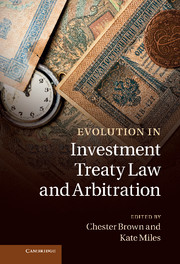Book contents
- Frontmatter
- Contents
- Contributors
- Editors' preface and acknowledgements
- Table of cases
- Table of Treaties
- Part I Introduction
- Part II Shifts in fundamental character
- Part III Actors in international investment law
- 8 Sovereign wealth funds and international investment law
- 9 Investor misconduct: Jurisdiction, admissibility or merits?
- 10 The European Union as a global investment partner: Law, policy and rhetoric in the attainment of development assistance and market liberalisation?
- 11 The ‘fair and equitable treatment’ standard and the circumstances of the host State
- 12 The plea of necessity under customary international law: A critical review in light of the Argentine cases
- 13 Making way for the public interest in international investment agreements
- 14 The participation of sub-national government units as amici curiae in international investment disputes
- Part IV The new significance of procedure
- Part V Engagement with cross-cutting issues
- Part VI Conclusions
- Index
- References
14 - The participation of sub-national government units as amici curiae in international investment disputes
from Part III - Actors in international investment law
Published online by Cambridge University Press: 05 December 2011
- Frontmatter
- Contents
- Contributors
- Editors' preface and acknowledgements
- Table of cases
- Table of Treaties
- Part I Introduction
- Part II Shifts in fundamental character
- Part III Actors in international investment law
- 8 Sovereign wealth funds and international investment law
- 9 Investor misconduct: Jurisdiction, admissibility or merits?
- 10 The European Union as a global investment partner: Law, policy and rhetoric in the attainment of development assistance and market liberalisation?
- 11 The ‘fair and equitable treatment’ standard and the circumstances of the host State
- 12 The plea of necessity under customary international law: A critical review in light of the Argentine cases
- 13 Making way for the public interest in international investment agreements
- 14 The participation of sub-national government units as amici curiae in international investment disputes
- Part IV The new significance of procedure
- Part V Engagement with cross-cutting issues
- Part VI Conclusions
- Index
- References
Summary
In 1937, the US Supreme Court stated, ‘In respect of all international negotiations and compacts, and in respect of our foreign relations generally, state lines disappear. As to such purposes the State of New York does not exist.’ This memorable but oversimplified statement summarises the convention that federal governments are the actors who count in international law and international affairs. Consistent with this view, sub-national government units have played a limited role in the arbitration of international investment disputes. Their most common appearance has been as the governmental entity that has allegedly breached a nation's investment obligations, but their role has seldom involved ‘a speaking part’. Is that likely to change? Should it change?
Three different activities prompted these questions. The first was a conversation with a staff member in the California Attorney General's office who worked on the Methanex case. She expressed both satisfaction and frustration about her position in the case: first, she was very pleased with the US government's handling of the case – as is not surprising since the United States won – but also frustrated that she and her colleagues could not represent themselves. The second activity was my writing a paper on the development of the quasi-precedential norm whereby amici curiae can participate in investment arbitrations. I wrote that in future we would likely see provincial and local governments acting as amici in cases involving challenges to their measures. My confidence in this prediction had been bolstered by the filing of an amicus curiae brief by the Quechan Indians in the North American Free Trade Agreement (NAFTA) dispute between Glamis Gold Ltd and the United States. Third, I was reading several articles describing the resurgence of ‘federalism’ in the United States – which, contrary to what one might think, suggests a greater exercise of authority by state governments rather than an increase in the power of the federal government – and the concomitant increase in sub-national governments' engagement in foreign affairs. One US scholar, Robert Ahdieh, advocates an embrace of this multi-jurisdictional approach to foreign affairs as a way to promote greater innovation in regulation and governance and even to achieve greater democratic representation as more people at different levels of government become involved. Could such an approach be beneficial for investment law? What would be the pros and the cons?
- Type
- Chapter
- Information
- Evolution in Investment Treaty Law and Arbitration , pp. 298 - 316Publisher: Cambridge University PressPrint publication year: 2011



